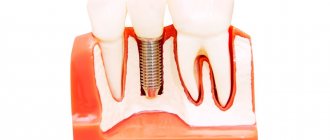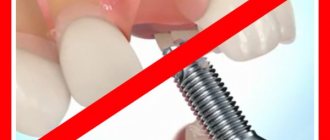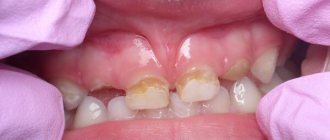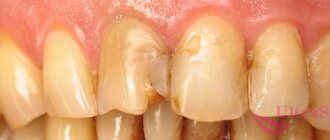Some patients mistakenly believe that it is necessary to prepare for implantation in the same way as for a serious surgical operation: undergo a huge number of tests, adhere to a certain diet for several days and undergo many additional examinations. Installing an implant undoubtedly requires some preparation, but not nearly as serious as is commonly thought. A specialist in the field of surgery and dental implantology, Magomed Umatgireevich Dakhkilgov from the GERMAN IMPLANTOLOGY CENTER in Moscow, talks about the features of planning implant treatment.
How is the first consultation with the patient before implantation?
In my opinion, at the first consultation it is very important to establish contact with the patient. At the same time, I never start a conversation with the question: “What are you complaining about?”, but follow an algorithm that implies a certain order of actions:
- finding out the reason for the patient’s visit;
- determining the degree of his awareness of the problem;
- bringing him up to speed;
- clarification of the patient’s wishes regarding the final result of treatment;
- awareness of its temporary capabilities;
- interest in the patient's readiness to begin treatment;
- taking photographs of the oral cavity;
- invitation to a consultation with other specialists (orthopedist, orthodontist) to identify all existing problems;
- carrying out complex treatment before implantation.
How to avoid pain?
Many patients' perceptions of the pain of dental implantation are significantly exaggerated. Thus, modern anesthetics can almost completely eliminate the possibility of pain.
Another thing is that after the anesthesia stops working, discomfort will make itself felt. But it can be stopped with conventional anesthetics, as well as by adhering to the individual doctor’s recommendations that everyone receives after surgery: cold, rest, etc.
What tests are taken before dental implantation?
Analyzes are always the answer to some question. And if there is no question, then why should we answer it? Believe me, I am a specialist and have been working in dentistry for a long time, so I can identify diseases that cause complications during implantation without additional tests. In addition, I learn a lot from a conversation with a patient - after all, he is not an enemy to his health and he himself will talk about the diseases that bother him. In this case, I, of course, will refer the patient for additional diagnostics to other specialists. But I don’t see the point in sending everyone indiscriminately for tests before implantation.
If a patient has a disease that he does not want to talk about (for example, hepatitis), then neither he nor other visitors to our dentistry should worry - the level of sterilization in our dental center is maintained at the highest level.
Basic tests
- General blood analysis. This means expanded with the formula. It allows you to determine the general readiness of the body for surgical intervention and the ability of the immune system to protect itself. Valid for 7-10 days.
- Blood chemistry. To determine the level of calcium, urea, creatinine, glucose, bilirubin, AST and ALT.
- Test for HIV/AIDS. These diseases exclude the possibility of surgery due to the lack of immunity and the body’s inability to fight infection.
- Syphilis (or RW). If the disease is present, there is a risk of implant rejection and infection of medical personnel.
- Hepatitis B and C. Having liver disease can affect blood clotting. In this case, any surgical intervention is undesirable. At the same time, a positive test for dental implantation is not always a contraindication to the operation.
- Coagulogram. Analysis to determine blood clotting parameters. Low clotting ability threatens bleeding during the operation or upon its completion.
- For blood type and Rh factor. This information is needed in case a blood transfusion is necessary. Although the chance is low, doctors take a responsible approach to the operation and often include the procedure in the list of mandatory ones.
When is an examination before dental implantation not necessary?
Every year the list of contraindications becomes shorter and shorter, so today only a few diseases can cause implant rejection. All contraindications can be divided into two groups: absolute and relative. The absolute ones include autoimmune diseases, such as lupus erythematosus, multiple sclerosis, rheumatoid arthritis and the like, as well as diseases in which tissue regeneration is impaired: AIDS, some hormonal diseases, conditions after chemotherapy and organ transplantation.
Patients with relative contraindications require more careful monitoring. By the way, this same group includes people with poor oral hygiene: a person who does not take care of their dental health is more likely to have an implant rejected than, for example, a patient who suffers from diabetes but carefully monitors their health. But there are no age restrictions for implant treatment, since when installing an implant everything depends on the state of the human body, and not on his biological age.
Initial examination
Before dental implantation, you need to visit the dentist's office for an initial consultation. During this procedure, the doctor will carefully examine the oral cavity, assess its condition and give a referral for x-ray diagnostics and tests. Already at this stage, the dentist can:
- determine indications and contraindications for implantation;
- inform the patient about the features of the upcoming operation.
In addition, during the initial examination, the patient must fill out a questionnaire (survey card), in which the presence of bad habits, chronic diseases and surgical interventions should be noted.
| We strongly recommend that you fill out the survey card honestly. Then our doctors will know better how your body will behave during implantation. |
Do I need any additional preparation for dental implant surgery?
Oral hygiene training is mandatory. I believe that it is time for all patients to get used to the idea that hygiene should be taught to us by a specialist, and not by advertising. As for people with orthopedic or orthodontic structures, they definitely need their own individual hygiene regimen, which only a specialist can develop.
As for other preparatory procedures, everything is individual. In some cases, it is impossible to install an implant without first sanitation of the oral cavity, and sometimes inflammation can be eliminated during the process of implant treatment. In order to find out, consultation with several specialists is necessary.
Photos before and after implantation at the Research Center. Works by Dakhkilgov M.U, Karneev A.N and Avetisyan R.A
Assessment of bone tissue and teeth before implantation
Bone grafting - 5 ways to build bone tissue
When restoring teeth, the volume of jaw bone tissue is of great importance, as well as the presence or absence of units in the oral cavity and their condition. With the loss of even one element, the bone, left without chewing load, begins to decrease in this place. If there is no segment or all are missing, then the bone tissue gradually atrophies along the entire length of the jaw. This process prevents the installation of implants, since there is simply nowhere to put them.
To assess the condition of bone tissue, a study performed on a computed tomograph (abbreviated as -) is required. It is this that allows you to obtain a three-dimensional image of the jaw with high accuracy. In addition to the bone itself, the image shows in detail the location of nerves, sinus cavities, large arteries and vessels.
If it is intended to involve the zygomatic bone, which extends beyond the jaw system, then a more high-quality study will be needed - multislice computed tomography. Equipped clinics have their own computed tomography scanner, but MSCT in dentistry is a very rare case. Therefore, for such a study, the patient is sent to a specialized center.
Important! The diagnosis should be made on the basis of a CT scan, and not an orthopantomogram, since this particular diagnostic method gives a complete picture not only of the condition of the bone tissue, but also of inflammation in the bone, granulations around the roots of the remaining elements, cystic growths and other problems.
At what point do you agree on the timing of treatment?
Treatment periods can range from three months to several years, depending on the complexity of the clinical case. Of course, if a patient comes to our clinic with a request to restore his tooth in one day, we can do it. But only if the patient’s clinical condition allows it. Otherwise, rejection may occur.
Also, the time of dental implantation depends on the process of bone tissue restoration and the presence of concomitant diseases. I knew examples where the engraftment process lasted longer in young people than, for example, in older patients. So everything is individual.
Read also
A new way to restore teeth - implantation without surgery
Modern dental implantation: methods and their features
Why do you need to prepare for implantation?
It allows you to divide patients into those who are indicated for implantation and those who are suitable for traditional methods of orthopedic care. Not only negligent attitude towards health is a contraindication. Excessive coffee consumption and smoking are social contraindications.
What if the implant doesn’t take root?
The likelihood of rejection is minimal. It does not exceed 1% out of 100. Sometimes rejection is a consequence of an incorrect approach to treatment, when the material and dimensions of the implant were chosen incorrectly. Sometimes the patient himself is to blame for such developments. Let’s say that during a dental implantation operation he did not maintain sufficient hygiene, as a result of which inflammation of the tissues of an infectious nature developed.
Preparation before dental implantation
will disappear if the patient’s chronic diseases worsen. Individual intolerance to individual components will also interfere with engraftment.
Here's Why Preparing for Dental Implants
. The presence of an experienced doctor nearby in combination with the patient’s compliance with all recommendations leads to successful implantation.
What to do before implantation?
- Do not eat or drink 2 hours before implantation. But eliminating breakfast completely is not recommended. Strength will definitely come in handy, so a light snack will even do you good.
- You are allowed to take sedatives an hour before surgery. The doctor chooses the drug individually when the patient experiences strong emotional anxiety before the manipulation. What you shouldn't do is use alcohol as a stress reliever. It is prohibited to use it.
- Teeth brushing is required 30 minutes before implantation.
- Good sleep and a positive attitude are almost half the success, because in this way you protect yourself from dark thoughts. Go to bed early the night before surgery, preferably the day before.
Speaking about preparation for implantation, a specialist should definitely pay attention to the oral mucosa. The following parameters are important:
- Thickness;
- Mobility.
The anatomical formations of the dental system and their location relative to each other are also important. In addition, the implantologist looks at the features of the bone tissue, its structure and size, and the anatomical features of the jaw.
Preparation for dental implantation. Video.
How to avoid pain?
Individual selection of painkillers is the prerogative of the attending physician. If dental implantation is planned, preparation for surgery
makes it possible to select anesthesia to eliminate pain. Patients today have access to high-quality painkillers. In combination with modern equipment, they allow dental implantation to be performed without pain.
Age restrictions
There are no strict restrictions. Even in elderly patients whose age exceeds 70 years, good results are observed. As for adolescents, the success of engraftment is determined by the characteristics of the bone tissue. For boys, it is recommended to have implants from 19 years of age, while for girls the procedure can be performed from 17 years of age.
Dental implant design and choice
It is defined:
- Condition of the dentition;
- Width of jaw bone tissue;
- Heights of the jaw bone tissue.
First of all, the outcome of implantation is influenced by two factors:
- Surgical technique;
- Proper preparation of the material.
The next step is the doctor’s recommendations and how the patient implements them.
How long will implants last?
There is no service life as such for dental implants. But this is fair to say in relation to those of them that were installed correctly. If the implant takes root well, the person will use it throughout his life. He will not have to worry about the service life of the implants.
How to achieve this:
- Adhere to general hygiene rules;
- Reduce jaw injuries to a minimum;
- Avoid mechanical factors;
- Professional cleaning combined with regular home cleaning.
All this will extend the life of the implants and guarantee oral health.
What to consider before planning implantation
When deciding to undergo implantation, you should take your choice of clinic and doctor seriously. The success of the operation, the duration of treatment and the service life of the implants depend on the actions of the patient, but the professionalism of the clinic team plays a decisive role. It is better to consider 2-3 centers at once to compare and choose the best one. When visiting the clinic, you should pay attention to:
- Location. Choose a dentist that is easy for you to get to.
- Equipment. The clinic must be well equipped (for diagnosis, treatment, operations). Plus - the presence of a separate surgical unit and its own dental laboratory.
- Documentation. By agreeing to implantation, the patient signs an agreement with the clinic. Pay attention to the list of services that are included in the cost of implantation, guarantees, price, payment terms (should not change from the moment the contract is concluded). Discuss warranty periods and warranty cases.
- Price. Study the prices of several clinics. When you see a temptingly low price for implantation, you don’t need to be seduced. An operation involving the installation of high-quality implants, performed by a highly qualified implantologist, cannot be cheap.
- Reviews. Study opinions on clinic websites, forums, ask friends or relatives.
- Doctor's qualifications. The implantologist must have a diploma confirming higher education and advanced training certificates. It is better if the operation is performed by a maxillofacial surgeon.
- Comfort. Communication with an implantologist is long-term—the level of trust and approach are important. Choose a specialist whom you can trust with your health.
It is worth focusing on the predicted results of the operation. The doctor must choose the optimal solution to your problem. A professional does not sacrifice smile aesthetics for quality or vice versa, so do not settle for conflicting results.











